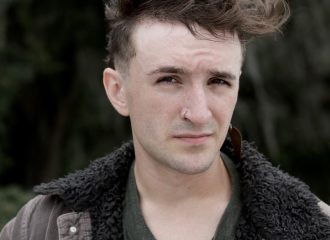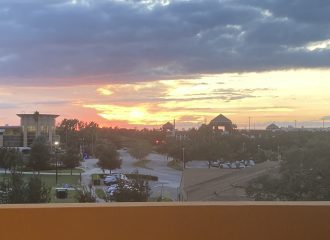by Alex Burton
Some people know it from a very young age. Others discover it gradually through self-exploration and deep internal examination. In my own case, the notion that I could even possibly be bisexual came swiftly and unexpectedly, like a violent slap in the face. At the beginning of my sophomore year of high school, I crushed on boys (and only boys) like any “normal” teenage girl: the walls of my room were plastered with magazine cutouts of my favorite members of Avenged Sevenfold, my heart was set on the quarterback of the school football team, and I even toted a book bag plastered with an image of Johnny Depp. It wasn’t until halfway through the year when I discovered I had very strong, very confusing feelings for one of my closest female friends.

I tried to shrug off the feelings, attributing them to some hormonal imbalance or trick of the mind. Having grown up in a Catholic environment and attended religious schools from preschool until the end of my high school career, I was always taught that homosexuality was wrong. You may be able to imagine my horror at the onset of these feelings and the disgust I felt. It was wrong of me to even entertain the thought of an attraction to a woman.
Eventually, when I realized the feelings were not going away, I confronted my friend. It is extremely difficult to bring up such a stunning topic without stumbling over more than a few words (it was already hard enough for me to ask a guy to go to the movies!). Surprisingly, and luckily for me, she told me that she reciprocated such feelings for me, and the two of us entered into one of the most difficult and bizarre relationships I’ve experienced to this day.
Of course, both of us knew we had to keep it under close wraps. As we continued to grow a little older, more and more of the young men and women in our graduating class entered into relationships with one another. Together, we would watch them holding hands as they walked down the hall together and sigh longingly after them. The only public displays of affection we demonstrated were awkwardly long hugs before we left campus for the day. And could I “take her home” to mom and dad? Well, I did—just under different pretenses. As much as we both loved our parents, we knew they wouldn’t understand. We just continued on, stealing private moments when we could and trying to fit in with our peers the rest of the time.
Eventually, though, her parents caught wind of our clandestine relationship. I remember just how deeply my heart sank on the night when she called me, frantic, telling me she had accidentally left one of our love notes out on her home desk, which they had found and read. They were livid. Even as I talked to her, I could hear her parents’ heated voices in the background (“Who are you talking to? Is that her? Hang up the phone right now.”). She assured me she would do her best to work it out with them. Before she hung up the phone, I begged her to persuade them not to tell my parents, for fear of the kind of trouble I would be in.
Looking back on the experience, I realize just how sad my reaction was. Instead of letting her know that we could get through the issue together, I chose to be afraid of how my family would react. Instead of feeling like there was someone I could turn to in such troubling times, I felt as though any mention of my experiences would transform me into a social pariah amongst my peers and an absolute problem child in the eyes of my parents (AlthoughI had gotten straight A’s since my very first report card, never been in any trouble with my school or the law, never done any drugs or had any drinks outside the small flute of champagne my mom and dad offered me on special occasions, I felt as though being bisexual would negate all of my positive qualities). I spent one of the most tortuous nights of my life awake in bed that night and almost literally had to drag myself to school the next day for fear she would bring bad news with her usual morning greeting. My fears were somewhat alleviated when I saw her and she explained the rest of her night: her parents had agreed not to tell my parents what they had discovered as long as I did not see her outside of school again. As much as that hurt me, as much as it hurt both of us, it was the best response I could have hoped for. Since I didn’t have any openly gay relatives or friends at that time, I didn’t feel like I had anyone from whom to seek advice, and I decided it was better to end a young love than to be outcast among my friends, my teachers, and my own family. In my own private thoughts, I still identified as bisexual, but my then ex-girlfriend was the only other person who knew.
Regardless of not having come out publicly at that point in time, I still faced discrimination within the hallways and classrooms of my high school. Beyond my gender identity, I was always one of the “weird kids” among my peers. As the only female in the entire school with short hair, I experienced days when students I didn’t even know would go out of their way to point and laugh as they called me “faggot” or “dyke” (because everyone knows if a girl has short hair, she must be a lesbian…right?). The straw that broke the camel’s back, however, occurred in my senior year of high school. That year, as a class, we were all coming to voting age, and so before the election of 2008, my school’s religious leaders decided it was a good idea to bring in outside speakers to help inform us of the proper stances to take, should we decide to go to the polls for our first times. The main focus of that awkward, infuriating religions class was Proposition 8 and why it was important for us to vote against same-sex marriage rights. The speaker went so far as to not only explain that the Bible condemns homosexuality, but to also go on to say that homosexuality is a disease that must be cured. To my horror, I saw a large number of my peers, as well as the religion teacher herself, nodding in assent; I felt my cheeks flush in embarrassment. To this day, I still regret not speaking up in that class to let them know their words were hateful and hurtful. Despite acting shy in that setting, I knew I had reached my boiling point. I decided it was high time to tell my parents that their daughter was a “weirdo.”
Even with my years of experience since then, I think the hardest words I have ever had to say were the four I spoke that night: “Mom, Dad…I’m bisexual.” At first, they remained silent, staring at me as though there were lobsters crawling out of my ears. After a moment that seemed to take forever, my mom finally broke the silence, saying (bless her heart), “No, you’re not.” I asserted my position to them, explaining that I had felt such emotions and attractions for a few years at that point, though I still didn’t admit to my previous relationship. Their reaction was mostly that of stunned silence, with a few timid questions interjected. They let me know they were a little wary of me seeing anyone outside school at that point (“Do you have a ‘thing’ for all your female friends?”), but overall, they were not as angry and unreasonable as I had expected. They had simply never dealt with anything of the sort before, and they had no baseline from which to begin other than what they heard in scripture and religious teachings. They were not ignorant to the existence of homosexuality, they just never thought they would experience it so close to home. After our discussion, we spent a few awkward hours watching TV, my mother inquiring every so often whether I found this actress or that one attractive, and before I went to bed, they both assured me they would love me no matter who I chose to love.
With a renewed sense of hope and a smile on my face, I went to school the next day with the idea to have a private coming-out discussion with my closest friends. Again, most of them simply gave me strange looks. A few of them were, dishearteningly, disgusted by my confession and did not maintain friendships with me, but most of the few I told let me know they still accepted me. By that time, anyway, with my last year of high school about halfway over, I no longer cared if people gave me funny looks or threw homophobic slurs in my direction (though it did still hurt when my ex-girlfriend’s parents quite literally turned their backs on me when I saw them at school functions). I was almost done with the place forever.
As I grew more and more comfortable with my own sexuality, I began to research other young adults who had similar experiences while coming out to family and friends. Some of them I read about had as much relative luck as I did, if not more, and it thrilled me to see that acceptance was becoming more and more widespread. However, the more research I did, the more I discovered a still shockingly prevalent sense of close-mindedness. One case in particular, occurring just a year after I graduated, hit me very hard: the suicide of Tyler Clementi in late 2010. The young man, only a few months younger than me, killed himself when his roommate and another dorm neighbor spied on his homosexual relationships and publicly outed him through social media, using hateful language and slurs in their conversations about him. When I thought I had nowhere to go and no one who would understand me, I, too, considered committing suicide. I reflected on my own experiences and was forced to wonder, what if my parents had not been so understanding? What if none of my friends had accepted my lifestyle? What if I had stood up for homosexuality in that religion class and had been publicly ridiculed for the remainder of my high school career?
To hear that young men and women are persecuted to the point that they end their own lives is not only heartbreaking, but it is innately wrong. No one should be ill-treated simply due to his or her sexual preference, especially when neither homosexuality nor heterosexuality are choices (though such a fact has been debated, for example, by Sarah Palin versus the majority of the medical and mental health society). I did not find available support groups in high school, but that changed when I arrived at UCF. There are a number of support groups and associations available for the young LGBTQ (Lesbian, Gay, Bisexual, Transsexual, and Questioning) population on campus, including EQUAL, the Allies Program, and the OUTReach Advocacy Board. These groups offer health and wellness advice, assistance in coming out and transitioning, and multiple forums on awareness and acceptance of the LGBTQ community. Furthermore, Knight Allies provides a group for straight members of the community who still want to provide a safe and happy environment and eliminate homophobia. Since my arrival on campus, I have attended a few EQUAL meetings, and in the process have met great people, had fun, and learned a good deal about myself.
Overall, though I did experience some persecution and hatred within my school, I was lucky in coming out to my family and my close friends. Many young men and women do not find such luck in their own situations and are driven to drastic measures. If there is one thing you take away from this article, whether you are straight, gay, bi, lesbian, trans, or curious, I hope it is this: you are not alone. There are thousands of young adults across the country and the world going through the same hang-ups and hardships that you are. There are a number of affiliations and associations both on and off campus ready and available to help you in your transitions and to welcome you with open arms. Love is not a choice, and in a progressive society, neither is acceptance. The two go hand in hand.




